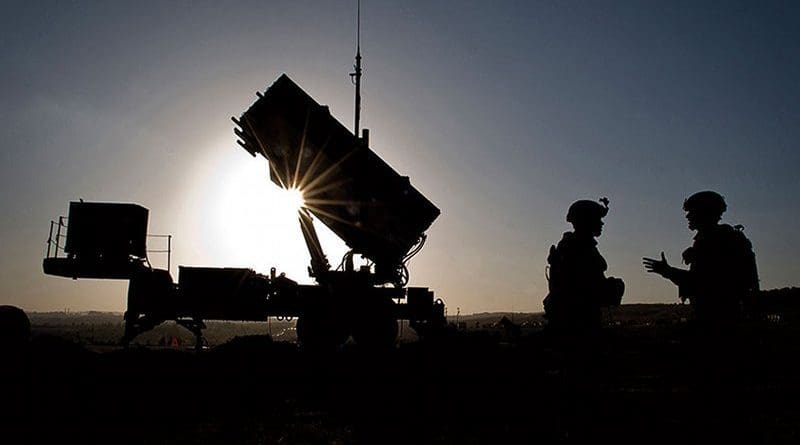Missile Defense An Obvious Opportunity For US-Gulf Cooperation – OpEd
By Arab News
By Luke Coffey*
It seems like there is a new missile or drone attack by Iranian-backed Houthi forces against the UAE almost every week. Civilian infrastructure such as commercial ports, residential buildings and international shipping are particularly targeted. In recent weeks, a few civilians have been killed and more wounded. However, these attacks have not been limited to civilian targets. Earlier this month, Houthi missiles targeted the UAE’s Al-Dhafra airbase, where Emirati, American and French soldiers are based.
According to US Central Command, “Iran’s ballistic missile force is the most formidable in the region.” It is no secret that Tehran has been supplying its proxy forces across the region with advanced missiles and drones. It is inconceivable to think that the region, or the rest of the world, could tolerate almost weekly air attacks against one of the most important financial, cultural and business centers in the Gulf. For the US, there is a particular interest in stopping these attacks. There are about 50,000 American citizens living in the UAE and hundreds of US troops are based in the country. Without proper air defenses, they are all sitting ducks.
It is no coincidence that these attacks have been increasing in recent weeks. Tehran knows that the Biden administration is weak after the defeat in Afghanistan. Not only are American partners and friends questioning President Joe Biden’s resolve when it comes to security commitments, US adversaries are willing to push the White House further than ever before. The fact that there has been no US retaliation against these Iranian-backed missile and drone attacks targeting US service personnel demonstrates this point.
Iranian leaders also know that the Biden administration is desperate for a new nuclear deal. For months, Iranian negotiators have been leading the US on by pretending that an agreement is just around the corner. Meanwhile, the Iranians have been using America’s desperation for a deal to squeeze out every last possible concession. Since the Biden administration wants a deal at almost any cost, the Iranians have assessed (correctly) that the US is likely to turn a blind eye to their malign acts across the region.
Luckily, missile defense systems based in the region have had some success during these recent attacks. Of course, the US plays an important role in regional air defense. The Patriot missile system and the smaller and more mobile Avenger system, supported by Sentinel radars, are present. Combined, these air defense systems form a layered defense to airborne threats such as missiles and drones.
However, it was reported last year that the Biden administration had removed eight Patriot batteries from across the region and one Terminal High Altitude Area Defense system from Saudi Arabia. With the recent increase in Iranian-backed missile and drone attacks, the timing of the removal of these assets could not have been worse.
Thankfully, air defense is one area where the Gulf states have really stepped up to the plate to take responsibility. For example, they provide nearly 80 percent of all regional air defense systems. Even though the US removed its THAAD system from the region, it is worth pointing out that last week the UAE’s THAAD system was used successfully in a combat role. This was a first.
It is in the interests of the US and the region to increase cooperation on air defense. In the first instance, the Pentagon should assess whether or not the decision taken last year to remove air defense assets from the region needs to be reversed. Not only would more US-Gulf cooperation on missile defense improve regional security and stability, but it would also accomplish two other important things.
Firstly, increasing missile defense cooperation with the Gulf states at this time could serve as an important confidence-building mechanism between regional countries and the White House. It is no secret that many in the Gulf are puzzled by the Biden administration’s lack of meaningful engagement in the region. Biden has not taken the time to visit, even though he has been in office for more than a year. And, from the view of the Gulf, there is too much emphasis on securing a new deal with Iran no matter what the costs. A good place to start in restoring US relations with countries in the region could be missile defense cooperation.
Secondly, missile defense cooperation between the US and the Gulf states could serve as an important catalyst for the proposed Middle East Strategic Alliance concept. This idea was first proposed by the Trump administration as a way to deepen US engagement in the region while increasing burden sharing. For a number of reasons, it never got off the ground. Perhaps the growing aerial threat from the Iranian-backed Houthis is a good reason to get the MESA proposal back on the agenda.
The next commander of US forces in the Middle East, Lt. Gen. Michael Kurilla, on Tuesday told the US Senate that he would “prioritize working with regional partners on their air defense systems with the aim of fully integrating air and missile defense across the region.” This is welcome news, but action is needed immediately.
The recent attacks targeting the UAE are merely an extension of Iran using proxy forces to target regional countries aligned with the US. Until Washington works with these countries to establish a credible deterrence, Iran will continue its reckless support for groups like the Houthis.
- Luke Coffey is the director of the Douglas and Sarah Allison Center for Foreign Policy at the Heritage Foundation. Twitter: @LukeDCoffey

